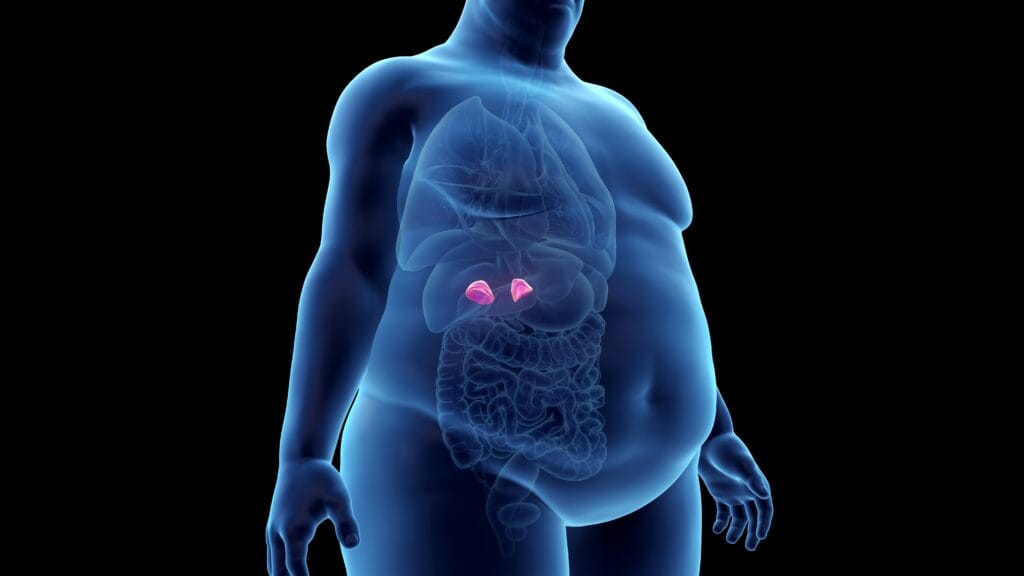
The hormone cortisol is blamed for weight gain, fatigue, and high blood pressure as the body copes with stress. So it’s easy to see why an ongoing problem with an overproduction of cortisol could result in major health issues – this is the basis of Cushing syndrome.
While cortisol might be blamed for negative effects on the body, it also helps the body with maintaining blood pressure, regulating blood glucose levels, and reducing inflammation. The adrenal glands are responsible for making cortisol.
For individuals with Cushing syndrome, their overproduction of cortisol either comes from within the body (such as an adrenal tumor or endocrine disease) or external factors to the body (such as taking steroid medications for a long period of time).
Who can get Cushing syndrome?
While it’s a rare syndrome, it tends to affect the following people:
Most often affects adults aged 30-50; however, it can occur in children.
It is three times more common in women as in men.
Those with a family history of tumors on their endocrine glands.
Those taking long-term steroids, such as prednisone.
Signs & Symptoms
The signs and symptoms of Cushing syndrome can vary, but those who have had high cortisol levels in their body for a long time often have specific signs:
Weight gain, particularly in the upper body
Slim arms and legs
A collection of fat at the base of the neck or a hump between the shoulders
Skin is easily bruised and slow to heal
Large stretch marks
Weak muscles
High blood pressure
High blood sugar
Osteoporosis (bone loss)
Fatigue
Mental health issues such as irritability, anxiety, and depression
Children with Cushing syndrome are typically obese and grow slowly compared to other children.
Women may experience excess hair on their body, including their face, and their periods may be irregular or stop completely. Men can experience lowered fertility and interest in sex along with erectile dysfunction.
While there are many signs and symptoms, not everyone has these symptoms which make it easy to confuse Cushing syndrome with other metabolic disorders. Some women are mistakenly diagnosed with polycystic ovary syndrome instead of Cushing syndrome.
Diagnosis
Diagnosis of Cushing syndrome relies on a detailed medical history, a physical exam, and lab tests to identify if there is excess cortisol. The medical history can help identify if long-term use of steroids is the cause of Cushing syndrome, in which case, no further tests are needed.
If steroids aren’t in the medical history, then lab tests begin. Once the excess cortisol levels are identified using urine, saliva, or blood tests, other lab tests are utilized to determine where there might be a tumor. These tests also might help rule out other conditions.
It can be a long and sometimes complex process to diagnose Cushing syndrome, and it is best identified by an endocrinologist who specializes in hormonal diseases.
Treatment
The purpose of treatment is to lower the level of cortisol in the body, which will help ease the signs and symptoms. If the issue is medication-based, the doctor may focus on lowering the dosage of steroids slowly.
If it’s caused by a tumor, the best option may be surgery to remove the tumor. Neurosurgeons can remove pituitary tumors by going in through the patient’s nose, or smaller incisions may be utilized for other tumors.
If the tumor is too small to be removed or can’t be found, the next option is to remove the adrenal glands (bilateral adrenalectomy). This immediately stops the body from producing cortisol; however, then the patient will need medications to replace certain hormones for the rest of their life.
Radiation may also be used in conjunction with surgery or if the patient can’t have surgery – small amounts of radiation are given over about 6 weeks to reduce the exposure across the body.
While not a cure, medication alone may help ease the symptoms of Cushing syndrome. There are medicines that control cortisol production in the body or can block the effect of cortisol on the tissues of the body. As with any medication, it can result in side effects such as vomiting, headaches, high blood pressure, low potassium levels, swelling, or even liver damage.
Sources & More Information
Mayo Foundation for Medical Education and Research. (2023, June 7). Cushing syndrome. Mayo Clinic. https://www.mayoclinic.org/diseases-conditions/cushing-syndrome/symptoms-causes/syc-20351310
U.S. Department of Health and Human Services. (n.d.). Cushing’s syndrome – NIDDK. National Institute of Diabetes and Digestive and Kidney Diseases. https://www.niddk.nih.gov/health-information/endocrine-diseases/cushings-syndrome
John’s Hopkins Medicine. (n.d.) Cushing’s Syndrome. Health – Conditions and Diseases. https://www.hopkinsmedicine.org/health/conditions-and-diseases/cushing-syndrome


